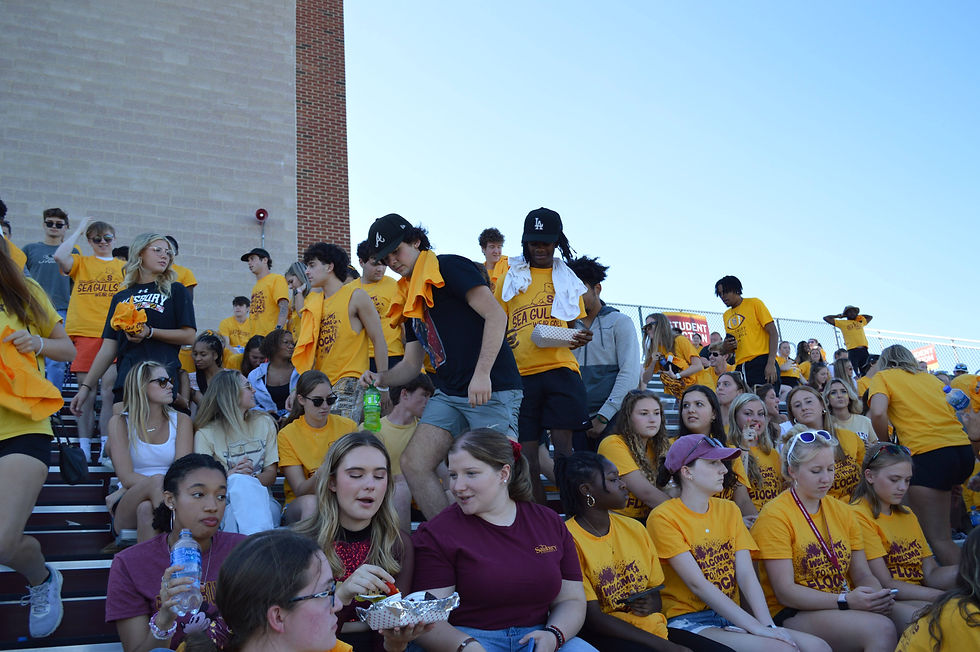A day in the life of an RA working around COVID-19
- Staff Writer

- Oct 29, 2020
- 4 min read
Updated: Nov 17, 2020
Coming back to SU, everyone knew that life around campus would be different due to all of the precautions set in place to prevent the spread of COVID. Such was especially true for residential assistants who would have to adapt to a new way of doing their job amidst the pandemic.
The experience of being an RA changed from previous years, starting with the training that the RAs receive prior to the start of the semester. Usually, the training consists of training for the job of being an RA, as well as a plethora of activities that allow the RAs to get to know one another and bond. However, due to COVID, training had to be held over Zoom.
“Really RA life changed starting back in training with needing to train differently because of restrictions equated to large gatherings, we ended up doing it online for the most part, where it was done via Zoom. They [the RAs] would get together within their smaller staffs and then they would all log into the zoom together and be able to watch the session and interact … but it was all via Zoom,” said Paul DeCock, the associate director of housing and residence life.
“The downside is that we weren’t able to do some of the things that really bring the staff together and bond and that really help the staff to get to know one another across campus…so that part was a little more of a challenge,” DeCock said.
Despite the inability to hold the training in person and the differences that this year’s training presented, many of the RAs felt that the training was still well executed and beneficial.
“Training was actually very well done; it was very different. The biggest difference I would say was interacting with the other RAs. It was a lot difference because it was all virtual, however, I think content-wise we got a lot of what we needed to in,” said junior Brock Forsythe, who has been an RA for two years.
Once the training was finished and students moved on campus, several safety precautions were put in place in order to allow RAs to do their jobs safely and to help keep students safe as well.
“For the position itself, a few more changes [were made] that are designed to help it be a safer experience. So clearly they all have masks and gloves if they need them and that sort of thing, and then when they sit on duty, there are the plastic guards at the desks and so that way they have that barrier when they are sitting on duty,” DeCock said.
RAs also had a new option when tasked with dealing with a student who has gotten locked out of his/her room. Pre-COVID, they would retrieve a master key and manually unlock the student’s door for them. However, they now have a contactless option if execution of the traditional way makes the participating student and RA uncomfortable.
“We have a little bit more of a contactless key in system, so the RA can certainly go in and do the lockout if they want to, but they can also do it contactless where they are handing out a temp card and then waiting for the students to use the temp card and let themselves into their room and then bring it back,” DeCock said.
Along with enforcing the zero-alcohol policy in the dorms, RA’s also are expected to enforce the new mask policy. Through the implementation of this policy, a student and any guests that are visiting their dorm must have a mask on at all times.
“At the beginning it [enforcing mask policies] was a little more difficult since more people would forget them or something like that, but I think overtime its gotten a little bit easier to enforce it, most residents are willing to comply with that,” said Forsythe.
The last major change to RA life was the events and programs that they usually orchestrate for their students. Typically, before COVID, RAs were required to host a number of social events for their residents. Such often included a movie night, pizza party, or craft nights.
However, due to COVID, holding such events isn’t as easy.
“The other big thing [change] is programming. Clearly they are not doing the traditional RA programs … because of the limited space and we didn’t want to have them serving any food … out of the same container, and so that piece has been different this year, where they are needing to do more kind of creative programs, whether it’s maybe a Zoom…or types of programs where they [students] are picking up [craft] supplies and taking them back to their room,” DeCock said.
Despite all of these changes, RAs and housing staff are working hard to ensure that students stay safe and are able to participate in different opportunities throughout the semester.
By LAURA AMRHEIN
Staff Writer
Photo Credit: Salisbury University Residence Life





Comments